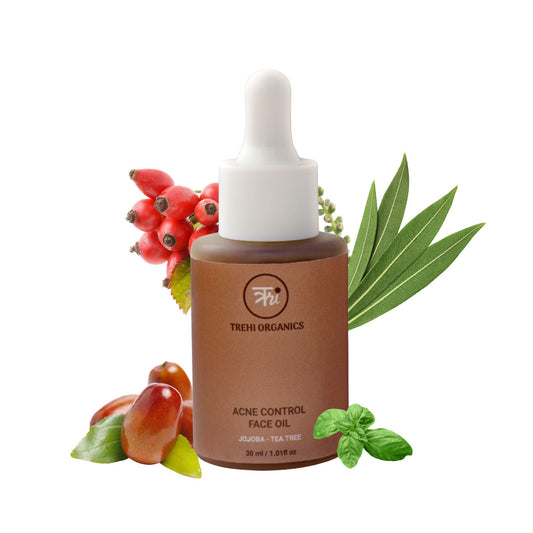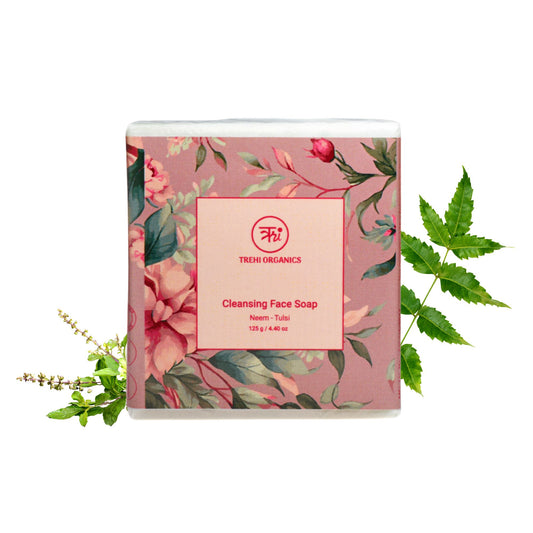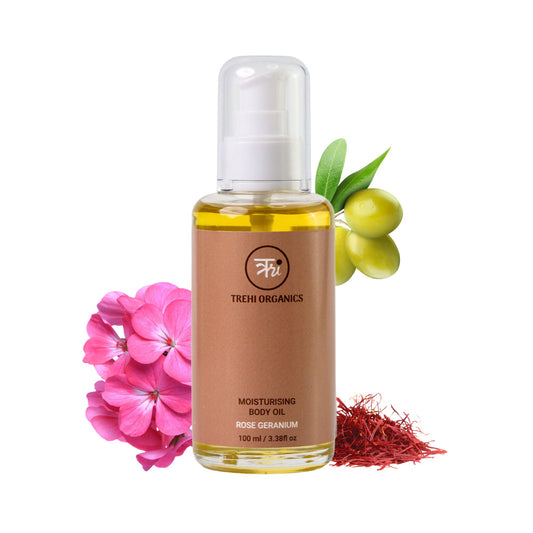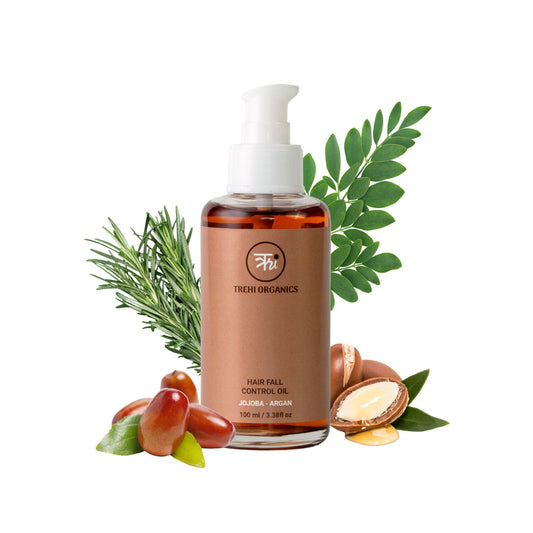In a world that believes in masking personalities, be someone who believes in the power of DIY face masks. Why not get a glowing complexion when you already have a glowing personality?
Face masks are a fad, no doubt, but are they fab? We don’t think so; that's why we are writing this detailed blog post to unmask the true intentions of commercial masks. More importantly, we'll shed light on how the goodness of natural ingredients in your homemade mask can reveal and enhance your inner glow. Because nature is the ultimate healer.
Gel-based face masks: Are they Good?
Before providing a verdict, let's examine some evidence. We've scrutinized a selection of popular face mask brands and identified potentially harmful ingredients.
| Category | Ingredients |
| Carcinogen | Paraphenylenediamine (PPD), Coal Tar Hair Dye, Quaternium-15, Parabens, Titanium dioxide, Formaldehyde, BHA & BHT, Coal Tar, Lead, Butylphenyl methylpropional. |
| Developmental Toxicity | Retinoic acid derivatives and octinoxate, (Retinol, Retin-A, etc.) |
|
Allergies and Immunotoxicity |
Fragrances, Diethanolamine, Lanolin, and Propylene Glycol, Triethanolamine (TEA), Paraphenylenediamine (PPD), Toluene, Octinoxate and other common allergy triggers |
|
Occupational Hazards |
Diethanolamine (DEA), Triethanolamine (TEA), and other amines that release formaldehyde under certain conditions |
|
Enhanced Skin Absorption |
Salicylic acid, Glycolic acid, Lactic acid, Citric acid, and other alpha hydroxy acids (AHAs) and beta hydroxy acids (BHAs) |
|
Contamination Concerns |
Heavy metals, pesticide residues, and other persistent pollutants |
|
Endocrine Disruption |
Bisphenol A (BPA), Phthalates, Perfluoroalkyl substances (PFAS), and other estrogenic or antiandrogenic chemicals |
|
Neurotoxicity |
Mercury, Lead, Arsenic, Toluene, and other heavy metals that can disrupt neurological function |
|
Organ System Toxicity |
Alcohols, Benzophenones, Toluene, Titanium di oxide and other solvents that can damage organs like liver, kidney, or lung. |
|
Reproductive Toxicity |
Paraphenylenediamine (PPD), Coal Tar Hair Dye, Quaternium-15, Parabens, Formaldehyde, BHA & BHT, |
|
Use Restrictions |
Certain phthalates, Triclosan, Methylchloroisothiazolinone (MCI)/Methylisothiazolinone (MI),Toluene, Fluorinated telomer substitutes, and other chemicals regulated by governments |
Note- We have compiled a list of some of the most common chemicals found in skincare products. However, it's crucial to note that this list is not exhaustive. When assessing other
skincare products, you can utilize the Environmental Working Group (EWG) website to investigate the potential concerns associated with additional ingredients. This empowers you to make informed choices about the skincare products you use.
Natural Face Mask Ingredients
Commercial gel-based face masks sometimes have chemicals you might want to avoid. Luckily, nature provides some fantastic ingredients with proven benefits for your skin. Here's how these natural homemade skincare options can step up your skincare game:
Beetroot Powder:
- Why It's Great:
- Fights Free Radicals: Beetroot has powerful antioxidants that protect your skin from damage caused by free radicals.
- Brightens Skin: The natural colors in beetroot can give you a radiant complexion and even out your skin tone.
- Soothes Skin: If your skin gets irritated, beetroot's anti-inflammatory properties can help calm things down.
Gram Flour (Chickpea Flour):
- Why It's Great:
- Gentle Exfoliation: Gram flour gently removes dead skin cells, making your skin smoother.
- Controls Oil: Perfect for those with oily or acne-prone skin, gram flour helps absorb excess oil.
- Brightening Effect: Regular use can make your skin look brighter and reduce dark spots.
Fuller’s Earth (Multani Mitti):
- Why It's Great:
- Tackles Oiliness: Fuller’s Earth is excellent at absorbing oil, making it a go-to for managing oily skin.
- Detoxifies Skin: It pulls out impurities, giving your skin a detox effect.
- Shrinks Pores: Fuller’s Earth can tighten your skin, making pores look smaller.
Turmeric Powder:
- Why It's Great:
- Soothes Skin: Turmeric has anti-inflammatory properties that can calm irritated skin.
- Fights Bacteria: It's good at fighting bacteria that can lead to acne, helping prevent breakouts.
- Brightening Touch: Turmeric can reduce dark spots, giving your skin a natural glow.
Triphala:
- Why It's Great:
- Rich in Antioxidants: Triphala is packed with antioxidants that help protect your skin from damage caused by free radicals.
- Promotes Moisture Retention: It promotes hydration, keeping your skin moisturized and supple.
- Enhances Radiance: Regular use of Triphala can enhance the radiance of your skin, giving it a healthy glow.
- Supports Collagen Formation: Triphala supports collagen production, which is essential for maintaining skin elasticity and firmness.
- Antioxidant and Anti-inflammatory Properties: It possesses antioxidant and anti-inflammatory properties, helping to soothe and nourish the skin for a healthier appearance.
Calendula:
- Why It's Great:
- Provides Sun Protection: Calendula offers natural sun protection, shielding your skin from harmful UV rays.
- Treats Acne: It has antibacterial properties that help treat acne and prevent breakouts.
- Improves Skin Hydration and Firmness: Calendula improves skin hydration, making it softer and more supple, while also enhancing skin firmness.
- Offers Anti-aging Benefits: Regular use of Calendula can help reduce the appearance of fine lines and wrinkles, promoting a youthful complexion.
Anantmool:
- Why It's Great:
- Evens Out Skin Texture: Anantmool helps to improve skin texture, making it smoother and more even.
- Cooling and Soothing Effect: It has a cooling and soothing effect on the skin, making it ideal for calming irritation and inflammation.
- Improves Skin Complexion: Anantmool helps to brighten and even out skin tone, giving it a healthier appearance.
- Safeguards from Oxidative Stress: It protects the skin from oxidative stress, preventing premature aging and damage caused by environmental factors.
Fenugreek:
- Why It's Great:
- Fades Pigmentation Spots and Acne Scars: Fenugreek has skin- lightening properties that help fade pigmentation spots and acne scars, giving you a more even complexion.
- Moisturizes the Skin: It is a natural moisturizer, helps to hydrate and nourish the skin for a smooth and supple texture.
- Reduces Signs of Aging: Fenugreek contains antioxidants that help reduce signs of aging, such as fine lines and wrinkles, for a youthful appearance.
- Exfoliates the Skin: It gently exfoliates the skin, removing dead skin cells and promoting cell turnover for improved skin health.
DIY Face Masks For Glowing Skin: 101
Making your own face mask is quite easy. Here you have the flexibility to create your own customized face mask tailored to your skin's needs. Choose any powder of your choice from a variety of options such as sandalwood, fuller's earth, manjistha, fenugreek, triphala, calendula, rose, or anantmool. These natural powders offer a plethora of benefits for your skin as discussed above.
For the base of your glowing skin recipe, select from ingredients like honey, raw milk, yogurt, rose water, or ghee based on your specific skin concerns. These bases provide hydration, nourishment, and soothing properties, catering to various skin types and issues.
Enhance the effectiveness of your DIY mask by adding a few drops of essential oils. Here are some options:
- Tea Tree Oil: Excellent for combating acne and blemishes.
- Lavender Oil: Rejuvenates tired and stressed skin, promoting relaxation.
- Ylang Ylang Oil: Uplifts your mood and provides a sense of well-being.
- Rosehip Oil: Rich in antioxidants and essential fatty acids, it helps in brightening and hydrating the skin.
- Frankincense Oil: Known for its anti-aging properties, it helps in reducing the appearance of wrinkles and fine lines.
- Geranium Oil: Balances sebum production and tightens the skin, making it suitable for combination and oily skin types.
- Chamomile Oil: Soothes irritated and sensitive skin, reducing redness and inflammation.
Here's a chart with more skin conditions and suitable powder, base, and essential oil options:
|
Skin Concern |
Powder Options (2- 3Tablespoons) |
Base Options (As needed) |
Essential Oils (2-3 drops) |
|
Acne-Prone Skin |
Fuller's Earth, |
Honey, Yogurt, Aloe Vera |
Tea Tree Oil, |
|
Fenugreek |
Lavender Oil |
||
|
Dry or Dehydrated Skin |
Sandalwood, |
Raw Milk |
Rosehip Oil, |
|
Calendula |
Chamomile Oil |
||
|
Dull or Uneven Skin |
Triphala, Rose |
Yogurt, Rose Water |
Ylang Ylang Oil, |
|
Frankincense Oil |
|||
|
Sensitive or Irritated |
Manjistha, Anantmool |
Honey, Coconut Oil |
Lavender Oil, |
| Chamomile Oil | |||
| Oily or Combination | Rose, Fuller's Earth | Yogurt, Cucumber Juice | Geranium Oil, |
| Tea Tree Oil | |||
| Dry or tanned |
Beetroot Powder, Fuller’s earth |
Honey, Yogurt, Aloe Vera | Frankincense Oil |
Experiment with different combinations to create the perfect DIY mask that addresses your skin concerns and leaves you with a healthy, glowing complexion.
Learn how to make a Turmeric face mask here!
Precautions and Tips
Here are some precautions you need to follow whenever trying these DIY masks.
Patch Test
Before trying a new face mask recipe, perform a patch test on a small area of your skin to check for any allergic reactions or sensitivity.
Consistency and Freshness of Ingredients
For best results, use fresh and high-quality ingredients when preparing DIY face masks. Avoid using expired or rancid ingredients, as they may cause irritation or have reduced effectiveness.
Avoiding Allergens
If you have known allergies or sensitivities to certain ingredients, it's essential to avoid using them in your DIY face masks to prevent adverse reactions.
Reading Labels: How To Spot Harmful Ingredients
Now you know how to make rejuvenating face masks yourself, but if you still choose to buy from the market, make sure to read the label wisely. Understanding product labels is vital, especially in the face of greenwashing and hidden harmful ingredients. Here are key guidelines to help you make informed skincare choices:- Beware of Greenwashing: Look beyond eco-friendly claims and check for specific ingredient information.
-
Question Vague Terms:
Terms like "botanical" may not guarantee safety; opt for clear ingredient lists. -
Check Certifications:
Seek products with trusted certifications like USDA Organic or EWG Verified, India Organic, and Ayush Premium Mark for trusted products. -
Doubt Excessive Claims:
Products with too many benefits may prioritize marketing over results. -
Research Harmful Ingredients:
Stay informed about common harmful ingredients to make safer choices. -
Prefer Short Ingredient Lists:
Choose simplicity; shorter lists often mean fewer unnecessary or harmful substances. -
Verify "Fragrance-Free":
Double-check ingredient lists, as "fragrance-free" may still use masking fragrances. -
Read Customer Reviews:
Real experiences from users can offer insights into a product's effectiveness.
Steps To Achieve Healthy And Glowing Skin
Getting healthy and glowing skin doesn't have to be complicated or expensive. At Yuvaap.com, we believe in a simple and holistic approach to skincare. It's not just about what you apply to your skin but also how you take care of yourself from within.
A healthy skincare routine, according to us, involves a good diet, regular exercise, enough sleep, and practices like pranayama and meditation. These elements contribute not only to the look of your skin but also to its overall health.
And when it comes to what you put on your skin, we recommend products that are not only effective but also safe enough to be ingested.
Embrace a holistic skincare approach with us at Yuvaap.com for naturally vibrant and healthy skin.
Conclusion
In a world captivated by trends, embracing your natural beauty is a timeless practice. Unmask the potential harm lurking in commercial masks and unlock the power of natural ingredients. Your skincare journey should be a celebration of your true self— simple, holistic, and naturally radiant. So, in your skincare journey, let the simplicity of natural ingredients be your guide, revealing the timeless beauty that lies within.
Say no to complexity, and yes to the authenticity of DIY face masks that make you uniquely beautiful.
Note: Our skincare advice is not from a medical professional or dermatologist. For personalized skincare recommendations and concerns, please consult a qualified dermatologist or healthcare provider.
FAQs
Q. How often should I use these DIY face masks?
Ans. The frequency of use depends on your skin type and the specific ingredients used. It's generally recommended to use a face mask 1-3 times per week for optimal results but make sure to listen to your skin and avoid overdoing it, excessive use can lead to skin irritation.
Q. Can I store these face masks for later use?
Ans. It's best to prepare DIY face masks fresh before each use to ensure maximum potency and effectiveness. Storing them for extended periods may lead to spoilage or reduced efficacy.
Q. Are there any side effects of using DIY face masks?
Ans. While DIY face masks are generally safe, some individuals may experience allergic reactions or skin irritation to certain ingredients. It's essential to perform a patch test before applying a new face mask to check for any adverse reactions.
Q. Can I customize these recipes according to my skin type?
Ans. Yes, you can customize DIY face mask recipes according to your skin type and specific concerns. Experiment with different ingredients and proportions to tailor the mask to your skin's needs.
Q. How long should I leave the face mask on my skin?
Ans. The recommended duration for leaving a face mask on varies depending on the recipe and your skin's sensitivity. In general, it's advisable to leave the mask on for 10-20 minutes before rinsing off with lukewarm water.





